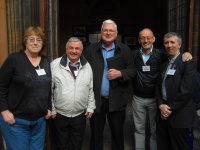Huge Support for ‘a Call to Action’ on Church Renewal
By Ellen Teague
Around 400 people attended yesterday’s second meeting of the movement ‘A Call to Action’, which is fostering dialogue about the future direction of the Church and Church renewal in Britain. The organisers were “overwhelmed” by the attendance, which forced the gathering out of Heythrop College in Kensington and into nearby St Mary Abbots Church. Nearly every diocese of England and Wales was represented and priests, religious and laity were all there in good numbers. The initiative started off in June when seven priests - Ian Byrnes, John Lally, Patrick McLaughlin, Frank Nally, Derek Reeve, Joe Ryan and Paul Sanders - wrote to The Tablet, calling for a more active encouragement of lay people in the work of the Church, and expressing concern that the call for collegiality made by Vatican II has not been realised. The first open meeting they organised on 18 July attracted 70 Catholic priests and deacons who shared concerns and discussed the future of the Church. In advance of the second meeting, some organisers had met with Archbishop Vincent Nichols at what was described as a “very good meeting”. Fr Joe Ryan of Westminster Diocese reported that “he agreed that something needs to be done” and “will observe our movement”. Yesterday, four speakers addressed themes in the Vatican II document, ‘Gaudium et Spes’, and its legacy for us today. Retired headteacher Chris McDonnell regretted that today’s Church “tends to look backwards rather than forwards”. There is significant distance between the laity and the hierarchy, he said, and lack of appreciation of how the imposition of the new liturgy has disappointed laity. He suggested that young people see hypocrisy in the Church, where, for example, former Anglicans can be married priests but not cradle Catholics. He asked: “How do we make our Church the Church of our children?” Sr Catherine O’Donovan, a Salvatorian who was based in Rome during the Second Vatican Council, described the impact of the Council on Religious. She said it was a “real joy” to see the priest facing people for Mass, to be able to wear more suitable garments for warm weather, and to be able to attend services of other Christian denominations and faiths when invited. However, she felt the Council did little to address the position of women in the Church, and it was many years before women could read from the sanctuary and before girls could become altar servers. “When I visit the Vatican now I feel I am going down into antiquity, especially when I see these old men shuffling around” she said, “and I just wonder where the children are going to fit in”. She concluded with, “we have to fix it!” Thomas O’Loughlin, Professor of Historical Theology at Nottingham University, pointed to the tension between the Church as a corporation and Church as community. “Many priests feel they are officers of a corporation” he said “but we must move towards Church as community”. He felt we should recognise the Holy Spirit at work in the world outside the Church, “and become the witnesses we are supposed to be”. Gerard Hughes SJ taught at Heythrop for 30 years and is now based in Oxford. He warned of a culture of fear in the Church which prevents lay people and clergy from saying what they really think and openly voicing contentious issues that are bothering them. “Local hierarchies are not able to say what is relevant in their regions because of fear” he suggested; “authoritarianism is rife in our Church and it undermines getting at the truth”. He received a round of applause when he suggested that the top-down appointment of bishops without consultation is an issue; “people of a diocese should have a say in the appointment of bishops and decisions shouldn’t just be made in a distant place”. It was clear in the 30 discussion groups that the contentious issues raised were of widespread concern. The groups called for the Church's need to listen and act on what was said; the building of trust, and “critical loyalty”. One group said it was “all very well to talk about Vatican II - but how many Catholics today really know what it said?” Back in the concluding plenary, Fr Patrick McLaughlin who spent seven years in peace and reconciliation work at Corrymeela in Northern Ireland, spoke of "opening up spaces where people can be listened to with respect and gentleness". He said ‘A Call for Action’ was not so much about focusing on specific issues, but a movement hoping to inspire grassroots groups regionally to open up serious dialogue, so that “still inspired by the Second Vatican Council we can contribute fully to the life of our Church so that we may be a more effective sign of the Kingdom of God”.??
|
.
Any original material on these pages is copyright © BishopAccountability.org 2004. Reproduce freely with attribution.
